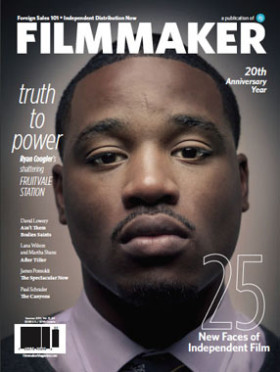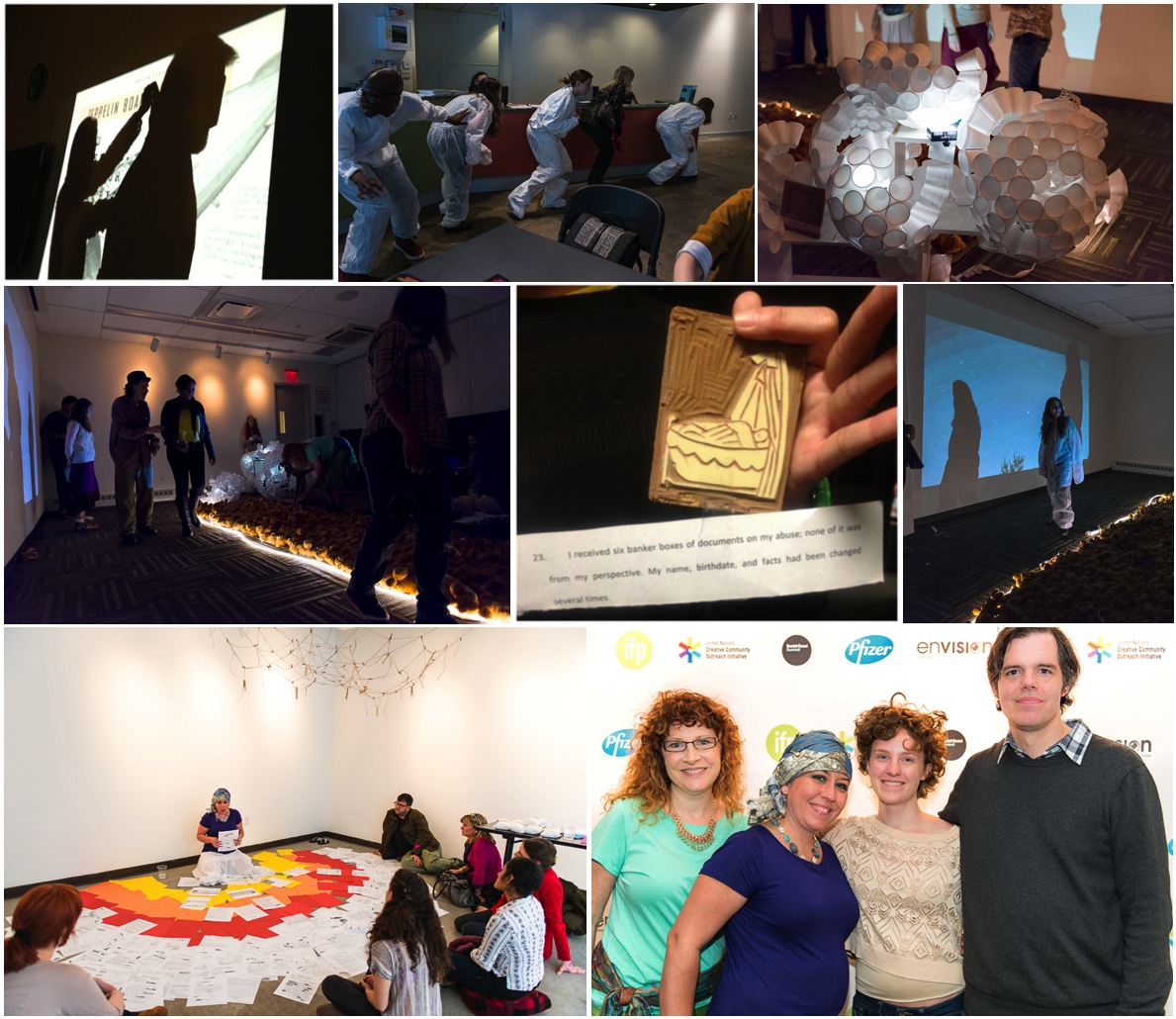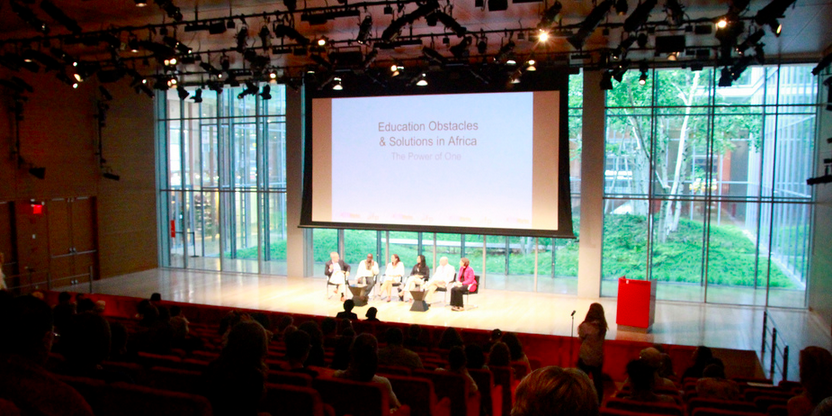This past fall Upworthy featured this inspirational and heatbreaking interview with Lydia that Thinkr produced. Elements of the storyline for My Sky is Falling were drawn from the life of Lydia Joyner, who was once a foster child.
Immersive Story System Map
The following is a look at the interaction design behind the My Sky is Falling prototype by Sarah Henry who captured the process and worked on the team. For full details please see the White Paper that Sarah authored in collaboration with the Harmony Institute and Reboot Stories.
This project system map is of an immersive story designed by Reboot Stories in conjunction with a graduate filmmaking course at Columbia University. It illustrates the user flow as audience members move from room to room, engaging with the narrative elements.

This is a full overview of an immersive narrative story design. Each node represents a potential point of engagement data collection about the audience members. Data points can also include things like objects selected or plot decisions.
The aesthetic choices of this chart reflect the steampunk and science fiction elements of the narrative.

This is a previous iteration.

Sketch of the process

The Waiting Room and Boarding Room

The Guided Room and Unguided Room

The Story Room, including optional Secret Room

SARAH HENRY is a current MFA candidate at SVA, where she studies Interaction Design. She is also a graduate of New York University, where in 2010 she received a bachelor’s degree in an interdisciplinary major of her own design. During this time she explored research in behavioral analytics, including courses in game theory, economics, cognitive psychology, political science, and sociolinguistics.
Since receiving her undergraduate degree, Henry has distinguished herself through positions in the private sector, focusing on technology and media, and understanding online behaviors. Her current research interests include the influence of narrative entertainment, the construction of participatory storytelling platforms, and the ways in which the physical arrangement of cities affect individual and collective behavior.
Turning the Tables

The summer issue of Filmmaker Magazine has a comprehensive write up on MSiF.
“Nervous laughter fills the air as a box of surgical masks is passed. Everyone is instructed to take one and place it over their mouths. With masks in position, the group of 12 is quickly ushered into an elevator. After a few moments there is a jolt — the doors open and everyone slowly funnels out. The seventh floor of the New School has been transformed into a sci-fi world. Debris covers the ground, and strange sounds echo down the halls. A lone girl staggers forward, her face concealed by a long mane of black hair. With head hung down and bloody tissues clenched tightly in each of her fists, she stops directly in front of us. Over the next 60 minutes our group will step into an experience called My Sky Is Falling. Guided by immersive performances and sensor technologies (everyone wears a bracelet that takes emotional arousal measurements — heart rate, skin conductance and motion), participants uncover a dystopian sci-fi tale that acts as a metaphor for the real-world experience of aging out of foster care. The data collected is the foundation for a framework that strives to create empathy, measure social impact and drive engagement using technology.
An experiment in purposeful storytelling, My Sky Is Falling raises an interesting design question: by designing “with” instead of “for,” is it possible to build better social services? Co-founder of Orange Duffel Bag Initiative Echo Garrett says, “Every year, 30,000 youth age out of foster care, typically when they turn 18. Within a two-year period, up to 70 percent will experience homelessness. More than 70 percent of those in prison report having spent time in foster care or homeless shelters as children. The cost of incarcerating a youth can be anywhere from $40,000 to $140,000 per year. Foster youth experience high rates of domestic violence, sexual trafficking and early death, often by suicide. You can’t put a number on the societal impact of this devastating loss of human potential.” It’s a wicked problem that is aggravated by a foster care system that came of age in the 20th century and is now struggling to adapt to the connected realities of the 21st.”

Press Release: My Sky is Falling at diy days
My Sky is Falling (MSiF) is an experience design that harnesses technology and story to create empathy for the challenges faced by foster care children. MSiF was presented at Envision on Thursday, April 11 as an innovative project going beyond the screen. Envision is a program of IFP in collaboration with the United Nations Department of Public Information. Guided by immersive performances and sensor technologies, participants in MSiF uncovered a dystopian sci-fi tale. The ending showed MSiF’s roots in real experiences of foster care.
MSiF will be presented at diy days NYC, a FREE and OPEN event for the public:
diy days NYC
When: Saturday, April 27th from 11:30am-4:30pm
Where: The New School – 66 W 12th St., New York City
Register: visit diydays.com and email info@diydays.com to reserve a spot
MSiF is written with filmmaker and Walla Walla Bing Bang Productions co-founder Lydia Joyner, who has her own experience in foster care. On creating this work, Lydia says, “When you grow up in foster care, your life becomes fragmented like sharp glass. But we can take the shards and create kaleidoscopes that allow us to see our lives in new, beautiful, and ever changing ways. I want to lead, teach and share, making a difference for the next generation of the traumatized and abused.”
MSiF is a project of Reboot Stories, a startup dedicated to harnessing story and technology for social change. Designing with instead of for is key to Reboot’s approach to purposeful storytelling. MSiF was designed with former foster care kids through a partnership with Echo Garrett, co-founder of Orange Duffel Bag, the only initiative in the nation advocating for and mentoring youth aging out of foster care. Creativity and expression is at the center of them supporting passion in their youth. Ira Deutchman, chair of the Columbia Graduate Film Program, helped open up Lance Weiler’s New Media Producing class last fall so we could beta test MSiF with interdisciplinary Columbia students, many of whom drive the project forward today. Data Researchers at The Harmony Institute have from the beginning worked alongside our storytellers to innovate new ways to measure the social impact of this immersive experience. Laura Arena of the Lucky Gallery has brought a host of passionate designers who have raised the aesthetic level of MSiF. Lastly, inventor Rosalind Picard, Sc.D. donated Affectiva biosensors from the MIT Media Lab to give further insight into social impact.
MSiF is an incredible phenomenon in co-creation in the spirit of innovation, open access and social good. Similarly to how people contribute freely to open source software like Linux, MSiF emulates a growing movement of open design initiatives; the value proposition of this rich community grows with every collaborator.
Reboot Stories uses an organic, iterative and open design process that draws from other projects and collaborators in our ecosystem. For MSiF, we began with a “Wish For the Future Open Design Challenge” at Columbia. Students and visiting artists created a design question and rapidly prototyped the solution. Over the semester, visiting game designers like Nick Fortugno, film producers like Christine Vachon and data researchers from the Harmony Institute worked with us to paper test game mechanics, new models for immersive data mining, and social impact. Lydia Joyner and other artists with foster care experience helped to write and give feedback on the project. MSiF was finally beta tested with an audience of 40 participants at the end of the semester.
MSiF will be published as a creative commons framework for foster care groups like the Brevard Family Partnership and ASPIRAnet to use in training sessions for potential foster care parents and social workers. We’re also experimenting with creating an online game. This immersive experience will be free to produce and open for all. The intent is to help participants understand on an emotional level what it is like to be a foster child.
Reboot Stories looks forward to seeing you at My Sky is Falling at diydays, on April 27th.
Links
myskyisfalling.com
rebootstories.com
harmony-institute.org
orangeduffelbagfoundation.org
envisionfilm.org
diydays.com
Twitter
#MSiF
@HInstitute

Envision
We’re thrilled to announce that My Sky is Falling will be staging a special immersive experience at the IFP and UN’s Envision event. Now in its 3rd year, Envision explores the power of storytelling as a vehicle for social good. Envision’s annual gathering connects UN experts and NGOs with some of the most creative minds in filmmaking and new media, and helps them work together to find new and compelling ways to create a momentum for social change. Through interactive mini-screenings and conversations, experts and advocates will pitch ideas to filmmakers, who will show how their work can bring complex and seemingly inaccessible issues to life. The day’s interactions and exchanges will result in collaborative, cross-disciplinary partnerships between people with fascinating, urgent stories to tell and people who know how to tell them.
On April 10th and 11th Envision will take place at the Tribeca 92Y. My Sky is Falling will be running throughout the day and will tie into a special presentation by MSiF Executive Producer and Reboot Stories co-founder, Lance Weiler.
Students from Columbia University are collaborating with foster children and creative director Atley Loughridge to design a special version of My Sky is Falling that relates to the theme of this year’s Envision event which is health.

Lydia Joyner
Elements of the storyline were drawn from the life of Lydia Joyner, who was once a foster child. She is the writer/director/producer of the film Sunny Lane. Here she is debriefing with participants via Skype.

Purposeful Storytelling
The following was originally part of a special series entitled “Wish for the Future” for GOOD Magazine written by MSiF Executive Producer and Reboot Stories co-founder Lance Weiler.
This past summer, I discovered the NGO Orange Duffle Bag. When a foster child turns 18, they are pushed out of care and encouraged to start their lives outside the system. Orange Duffle Bag provides mentoring and life-building skills in an effort to help foster children navigate a new chapter in their lives. Without a self-directed plan, many teens who age out of foster care are at high risk of becoming homeless, forced into prostitution, drug or alcohol addicted, or in jail by the time they’re 25. Only 3 percent go on to higher education and only 3 percent of that number graduate from college. Because so many people have access to their files, many become victims of identity theft. Upon trying to get a job or take out a college loan, they are greeted with the fact that someone has run up debts in their name.
After talking with Orange Duffle Bag, I was struck by the fact that some of the stories sounded as if they where a premise for a science fiction story.
Flash-forward to Columbia University, where I teach a course called “Building Storyworlds: The art, craft & biz of storytelling in 21c.” This graduate class is centered on the concept of purposeful storytelling.
My theory is that storytelling in the 21st century has an opportunity to be transformative in a way that enables those formerly known as the audience to become collaborators. Thanks to the democratization of tools to create and distribute media, the formerly top-down entertainment industry is now bubbling up with new stories and business models. So at Columbia, we are working to build a Story Design lab that mixes narrative design, game mechanics, and design science to tackle social problems.
Last week, we concluded a pilot for the Story Design lab. Columbia students and former foster kids (one being filmmaker Lydia Joyner) worked together to build an immersive storytelling experience. Participants came to realize that this was not just a sci-fi tale, but a story rooted in the experiences and feelings that our collaborating foster kids went through when they aged out of care.
By designing with instead of designing for, the students and former foster kids built an experience that created emotional connections and empathy for those who age out of care. The results were so strong that the framework for the experience is being considered by organizations like the Brevard Family Partnership as a way to help potential foster care parents. The hope is that by placing someone in an immersive experience, they will be able to understand on an emotional level what it is like to be a foster child.
Who can you design with?
My wish for the future:
How can we design with, instead of for, in order to build better social services?
To read more of the series visit www.good.is/future